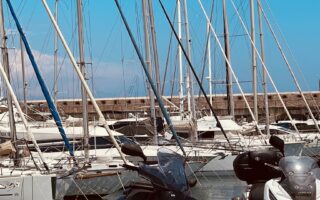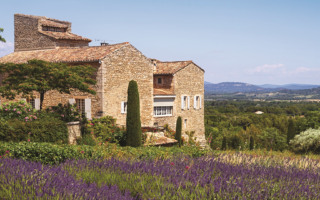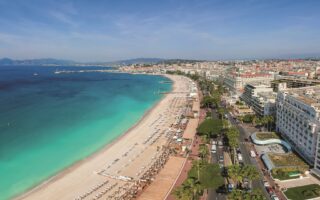The mane attraction
What better way to appreciate the golden stone and green countryside of the Lot than on horseback? Judy Armstrong takes to the saddle
What better way to appreciate the golden stone and green countryside of the Lot than on horseback? Judy Armstrong takes to the saddle A golden tower of honeycomb stone, a lush meadow blushing with poppies, an arched bridge, lumpy hills, rushing river. The train is moving slower as it approaches medieval Gourdon. Now the window shows a pristine sky, swooping swallows, a steep-pitched barn roof.Five hours after sliding away from Paris, the train stops. I emerge into the warm air, the soft sun, the gentle ambience of the Lot. Hans Vroom, a Dutchman who fell in love with, then moved to, this area seven years ago with his family, greets me by the station steps. “We visited France by car and motorbike, and spent a lot of time here,” he says. “We loved the climate and the places of historic and tourist interest. We also had horses, so we decided to combine the two passions, by taking guests to explore the Lot on horseback.”So, this is why I’m here. Travelling by human power is the ultimate in eco-friendly travel, but moving through wooded landscape on a grass-fuelled animal is surely as green as it gets. And while travel for its own sake is a joy, having a focus makes it even better.Recently, I was invited to visit Rocamadour, one of France’s most popular destinations for pilgrims and tourists. The churches, chapels and castles crammed onto a rock face looked beautiful, fascinating, unique – but I dislike arriving by car, staring at a sight’, ticking the box and departing.
Countryside saunterHans, through his UK representatives In The Saddle, soon solved this sightseeing dilemma. One of his trail rides through the Lot has Rocamadour at its heart: we would saunter through the countryside to this holy shrine, pay our respects and ride away. By travelling along narrow paths, through complex woodland, via a jigsaw of lanes, streams and meadows, we would also breathe, smell and feel the Lot as a car-tourist never can.Du Passe Temps, home to Hans, Hermina and their seven-year-old daughter Soleil, is a short drive from Gourdon, near the border of Lot and Dordogne. It is fresh off the page of a calendar, with a honey-coloured stone farmhouse and g�tes, vivid with roses, crimson shutters and grape vines. In the fields around the house, 18 horses graze; in the cobbled yard, two Great Danes doze. The g�tes are often occupied by families who don’t ride at all – the area is rich in interest, from cave paintings to ch�teaux. But mostly, Du Passe Temps attracts people who want to combine gastronomy – this is the land of foie gras, walnuts, duck and truffles – with exploration on horseback.“On a horse, you have time to absorb the landscape,” says Hans, pouring chilled ros�. “Last week we were cantering along and in front of my nose, a deer crossed the track. It looked, my horse looked, I looked, and everyone continued happily. It was quite wonderful.” Hermina joins us on the sun-warm terrace. She is pretty and feels like everyone’s best friend within minutes of arriving. Hans is hearty and happy, with a pencil-thin strip of beard; he competes in endurance rides up to 90 kilometres long and is as fit as his horses. Daughter Soleil is a wild, woodland creature: pale, fast-moving, with a wide smile. I don’t have them to myself for long. Soon Tom, a Norwegian celebrating his 50th birthday, arrives and we talk long into the night. This is Tom’s first trip to France and he is already overwhelmed by the beauty and diversity. Hans laughs. “Our guests arrive from all over the world, and most of them come back. A week in the Lot is never enough. So think of this as an introduction, not a once-in-a-lifetime experience.” Tom agrees with him. Hans has matched him with Pegasos, a gentle grey giant who takes to Tom like a child to chocolate. They quickly become inseparable and by the end of the week Tom, having reluctantly abandoned plans to smuggle Pegasos home in his hand luggage, is planning a return visit. One night, sitting on blue chairs in the shade of vines, he sighs. “I have a friend at work who, when I said I was coming to the Lot, described exactly this. Exactly. Golden stone, vines, flowers, peace, silence. It’s perfect.”For two days we ride from Du Passe Temps with Hans’ French friends and on our own. We visit the nearby village of Lantis with its 12th-century ch�teau; swim the horses in the local lake and gallop through meadows and orchid-rich woods. Tom is in heaven: “Riding holidays make me feel alive. It’s the contrast between sitting in an office tapping at a computer, and galloping through woodland. It’s amazing. I love it.”
On the roadA major factor in this is Hans’ horsemanship. Instructions, tack (the saddles are Stubbens!) horses and their care – it’s all of the highest quality, with Hans inspiring confidence in beginners and experts alike.The night before departure, we are joined by Americans Liz and Stephen, in France for a fortnight. “Some time ago I joined a horse-riding holiday in the Loire Valley, and I really wanted Stephen to experience something similar, to feel part of the history,” says Liz. “Oh, we are happy to be here. And to have sunshine! If you’d seen the rain in Paris…”There is excitement in the morning as we prepare to leave. Cooling gel pads are placed under the horses’ saddles for comfort in the heat and water bottles are filled. Hermina will meet us with lunch, but we have a fair distance to travel first.Hans leads our little cavalcade out of the hamlet, past red poppies and hay meadows, past Lantis and the ch�teau. It’s like riding through an Impressionist painting. Soon we are on new ground, in oak woods thick with orchids and honeysuckle. Panache, my beautiful chocolate-coloured horse, swings along sweetly, ears forward, enjoying the journey. I check my watch, then realise it is irrelevant. We’re on equine time now.And so we ride towards Rocamadour. Flowering broom and wild roses create swathes of yellow, flashes of pink. Most rivers have watermills – some converted, other derelict. Across valleys we glimpse sturdy churches and everywhere are pigeonniers. “Because it was once so poor, this is the only region in France where every peasant was allowed a pigeon tower,” explains Hans. Many have been rebuilt or absorbed into houses, retaining their form if not their function. The pale stone reflects the light, making even dark corners feel sun-filled.Gariottes, the beehive-like stone shelters for shepherds, flank ancient paths; we ride sunken roads and duck under branches, uncleared because few pass this way. There are 1,500 kilometres of bridleways in the Lot, with another 2,000 kilometres in the Dordogne. With Hans, we’ll ride 200 kilometres this week, leaving plenty more trails to explore.
Nature’s tableThis first day, Hermina meets us at the lake �coute s’il Pleut, near Gourdon. She has set up a picnic table by a bank of yellow iris; from the opposite shore, two fishermen stare in bewilderment. We take the horses into the lake to splash and drink, then cool down ourselves with chilled beer. Local tomme cheese, cured meat, home-made terrine, eggs from Hermina’s hens – it’s a feast. While each day, each lunch, each night stop is different, they follow a similar theme; mellow countryside, varied riding, isolated hamlets, friendly faces. People are surprised to see us, happy to wish us bonne route, bon courage. Gates are opened, traffic is stopped, horses are patted and photographed.Accommodation is quirky. Le Moulin de Planiol, a converted watermill run by a Belgian couple, has donkeys, a swimming pool and haute cuisine with fine local wine. From La Gardelle, a sympathetic conversion of stables and barns near Rocamadour, we share a glorious dinner of duck with four French walkers, eating outside with a view over the valleys. In the evening, cicadas chirp and in the morning, hot air balloons waft overhead. At Le Vieux Couvent, we are invited to a flower-strewn banquet with a group of Canadian artists, and wander through a wild garden of herbs, pools and secret corners.On the route, as in the convent’s garden, flowers abound. Our horses’ hooves swish through wild thyme and mint, wild iris fill streambeds. We ride through woods of oak, chestnut and silver birch, up steep trails to walnut orchards, past beds ripe with strawberries. We see thousands of butterflies, a handful of deer and, to my horror, a snake. Hans is highly amused: I am more scared than Panache.Physical highlights include the sculpted limestone gorge and silken stream of L’Ouysse; the scramble down scree past sunken fountains, set to ease the thirst of pilgrims on their way to the sacred city; and the exhilarating climb up the steep cliffs of the Alzou canyon, opposite Rocamadour. The fortified 14th-century watermill of Cougnaguet, the churches and distant ch�teaux, the sleepy villages and woodland cabins, the busy rivers and placid pools – they ease the Lot into our blood, hearts and minds.
Awe-inspiring sightsOf course, we visit our destination, Rocamadour. After a long day’s ride, we arrive in the late afternoon, when most tourists have gone home. Just as the travel brochures say, it is truly extraordinary. We follow wide, stone stairs to the arched entrance, file silently through the soaring church and chapels, admire the Black Madonna and Child and listen, rapt, to Hans’ explanation of the sword in the rock. We then read about miracles on plentiful plaques, tiptoe over exquisite mosaic floors, smell the hot scent of votive candles. Hans asks Stephen: “Do you have anything like this in America?” Stephen says: “Is that a trick question? And if we did, we’d probably turn it into a parking lot.” It’s hilarious, and it breaks the spell. We buy ice cream, laugh some more and return to the horses at La Gardelle. We ride, we chat, we absorb the scenery. And by the time we arrive, four days later, at Du Passe Temps, we realise something important. Rocamadour was the reason we came, but the star of this journey was not the churches on the rock. It was the horses, the people and, of course, the Lot itself. Predictably, the week is over too soon. Tom is emotional as he pats Pegasos goodbye; I stroke Panache’s fine face and he stares back with deep, black eyes. “This is the best horse and the best riding I have ever experienced,” declares Tom, still watching his new friend in the field. “Now I have to decide when to come back.”The next morning, I share a final breakfast with Hermina. “You should stay,” she says. “Stay and help us with the horses, explore more tracks, spend the summer here.” I look at her, and am twisted with the thought. I should, Hermina. I should.FRANCOFILEGetting thereTrain to Gourdon via Paris (Eurostar and TGV). Rail Europe Tel: (UK) 0844 848 4070 www.raileurope.co.ukFor more information on getting there and on horse-riding in France, see the Pr�t � Partir section from page 88.
Du Passe TempsTel: (Fr) 5 65 32 10 42www.dupassetemps.comThe equestrian centre and g�tes are a short drive from the pretty town of Gourdon. Trail riding, including the Ride to Rocamadour, is from April to October; riding lessons, the g�tes and chambre d’h�te are available all year. For details contact Hans and Hermina or In The Saddle, tel: (UK) 01299 272997 www.inthesaddle.com
In the area: Du Passe Temps is within easy reach of Gourdon, medieval Domme with its Templar tower, the truffle market at Sarlat, Lascaux and Pech-Merle cave paintings, and a profusion of castles including Beynac and Castelnaud.
Share to: Facebook Twitter LinkedIn Email


